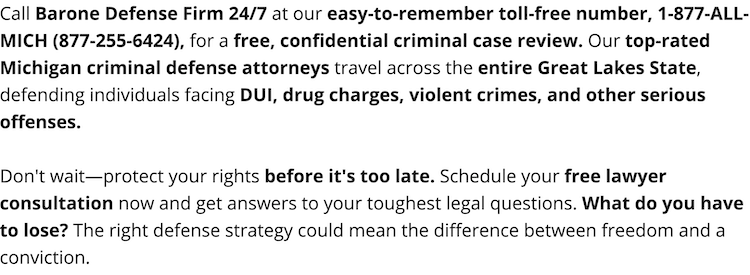Michigan Stand Your Ground
 Owning a firearm for self defense is an awesome responsibility. Therefore, people possessing or carrying firearms for self defense must know the details of Michigan’s self defense laws. These are commonly referred to as the Stand Your Ground Law and the Castle Doctrine.
Owning a firearm for self defense is an awesome responsibility. Therefore, people possessing or carrying firearms for self defense must know the details of Michigan’s self defense laws. These are commonly referred to as the Stand Your Ground Law and the Castle Doctrine.
The Stand Your Ground Law applies both inside and outside your home. The Castle Doctrine only applies in three situations; (1) when the self-defense act occurs inside a person’s home, or (2) business, or (3) during car jacking situations.
In a recent media appearance, Michigan self-defense lawyer Patrick Barone explained Michigan’s self defense laws, including the difference between the Castle Doctrine and the Stand Your Ground Law. The title of the article is Lawyer explains Michigan’s Castle Doctrine law: When you can and can’t shoot an intruder.
What is Michigan’s Stand Your Ground Law?
Stand Your Ground is a legal defense to an act of self-defense that results in the death or serious injury of another. This law allows you to use deadly force, with no duty to retreat, if you have an honest and reasonable belief that such force is necessary to prevent the imminent death, great bodily harm or sexual assault to yourself or to another individual.
For this defense to apply, you must be able to prove three things:
- You are not committing a crime or breaking the law. Note, this does not mean that they will not be charged with a crime, only that they were not in the commission of crime when the defensive act took place.
- The self defense occurs in a place you are legally permitted to be present, and;
- You must honestly and reasonably believe that deadly force is necessary to defend against imminent or immediate death, serious injury, or imminent sexual assault will or is occurring
This Stand Your Ground Law applies also to the use of non-deadly force. Generally speaking, you are only allowed to use the degree of force necessary under the circumstances. And, you must also satisfy the above three criteria when using non-deadly force.
Can I Still be Prosecuted if I Act in Self Defense?
Yes. Remember, a legal defense does not preclude prosecution! A person can be prosecuted even when all the elements of a successful defense are present.
 To help explain this, let’s look at the most contentious factor, whether a person has an honest and reasonable believe that the use of deadly force is necessary to eliminate the imminent threat of serious injury, sexual assault or death. This is a subjective belief.
To help explain this, let’s look at the most contentious factor, whether a person has an honest and reasonable believe that the use of deadly force is necessary to eliminate the imminent threat of serious injury, sexual assault or death. This is a subjective belief.
If the police and prosecutor believe that a “reasonable person” would have perceived the situation differently, then you can still face charges, even if you acted in self defense. In such situations, you may have to put your faith in your attorney and in a jury of 12 citizens.
In these tumultuous and chaotic times of social change and protest, the topic of self-defense is on people’s minds today more than ever. People around Michigan are wondering what their right to self defense is if a protestor or anyone breaks into their home.
If you are facing prosecution for a self-defense incident, please contact the 2nd Amendment and Self-Defense Trial Attorneys at the Barone Defense Firm are available for a free consultation.

 Barone Defense Firm Home
Barone Defense Firm Home
















